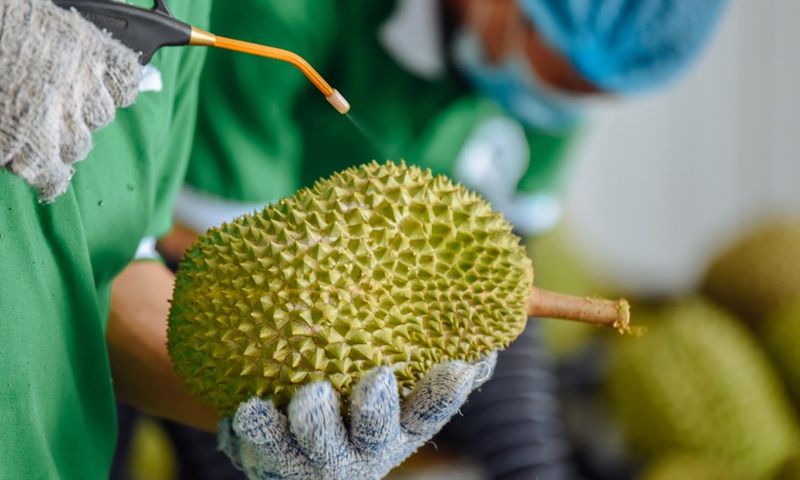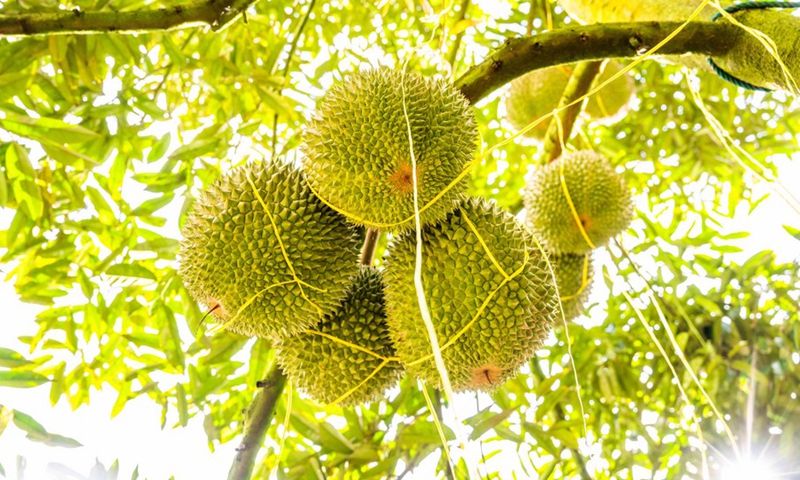Malaysia's durians, other agricultural exports to see boost under RCEP trade agreement

A worker cleans a durian at a durian processing factory in Pahang, Malaysia, June 18, 2019.(Photo: Xinhua)

The Black Thorn durians are seen at a durian orchard in Raub, Malaysia, Nov. 21, 2021.(Photo: Xinhua)
Malaysia's agricultural exports, including its much sought-after durians, will greatly benefit from the rolling out of the Regional Comprehensive Economic Partnership (RCEP), industry experts said.
RCEP will facilitate the broader market and development space for the development of Malaysia's agriculture, as well as strengthen agricultural investment and international cooperation between Malaysia and the RCEP members, Edwyn Chiang, secretary general of the Malaysia International Durian Industry Development Association told Xinhua in a recent interview.
"The signing and future of RCEP would undoubtedly bring benefits and development opportunities. Among the members of the agreement, ASEAN, China, Japan and Australia are all important agricultural countries, and there is a huge space for the development of agricultural economy and trained cooperation between Malaysia, and China, ASEAN, Japan and Australia," he said.
Chiang also said the golden age of the durian trade has begun, predicting that by the year 2030, the export volume of durians will increase by 50 percent, and the production of the well-known Musang King variety of the fruit will double.
"At the same time, the external market competition influenced by the agreement will also help the development of domestic agriculture, and reshape the regional industrial chain, and the value chain of agriculture," he said.
Deputy Secretary-General Michael Chai Woon Chew of the Associated Chinese Chambers of Commerce and Industry of Malaysia said the agreement will boost the export of a whole range of Malaysian agricultural products to China while helping to raise local production standards.
Chai explained that the Malaysian durian industry has worked hard to comply with China's stringent importation requirements and this is well worth the effort considering the vast size of China's domestic consumer market, especially the demand for tropical fruits.
Malaysia first exported whole frozen durians to China starting in 2019, after the country's authorities cleared the fruit for export.
In 2020, China imported around 575.9 million kg of fresh durians, with an import value exceeding 2.3 billion U.S. dollars. Between 2017 and 2020, China's annual import value of fresh durians increased more than threefold, according to market and consumer data provider Statista.
Next: Pavilion Paper Art Garden set in Malaysia to celebrate upcoming Chinese New Year
Related Reading
- Singapore Airshow expects sharp fall in visitors
- Duterte thinks recent COVID-19 deaths were mostly unvaccinated people
- The explosion of the Nord Stream 2,An impartial joint investigation team should be established
- NZ police arrest, remove COVID-19 demonstrators
- China Overseas Development Association Holds Press Conference of the 14th China Overseas Investment
- RCEP to take effect on first day of 2022, extend Asia-Pacific industrial chains in closer bond
- PANDA'S SINGING 2023 Chengdu (International) Children's Choral Music Week closed
- South Korea releases frozen funds to pay Tehran’s dues
- Amazon nearing climate ‘tipping point’ faster than expected
- UN appeals to support Palestinian refugees
